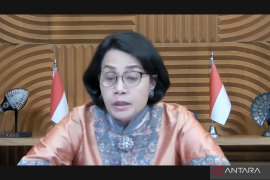"Bank Indonesia will not hesitate to raise the BI Rate if there are signs of a rise in core inflation, We do not like the rising inflationary pressures although they were caused by price increases in the food groups because it will affect core inflation through expectations," Sarwono said here Monday.
The recent inflation derived from the 2010 consumer price index was very high and has impacted the public`s 2011 high inflation expectations.
Jakarta Composite Index (JCI) drop in the last week`s closing and Monday trade drop did not caused by the high inflation expectations, he said.
"The JCI was corrected by global influence, as seen in Asian region markets were corrected by the US improving economy," he said.
Hartadi said that the condition caused a flight to quality effort from the emerging market countries` assets such as Indonesia, such correction is predicted as temporary to gain profit, he said.
According to the central bank`s data, the consumer price index (CPI) in December 2010 reached 0.92 percent (month to month) or 6.96 percent (year on year).
The CPI inflation realization`s figure is higher than the government`s inflation target ranging 4-6 percent.
Inflation deviation of the main target was mainly caused by the high volatile foods that reached 17.74 percent (year on year) due to production and distribution interruption from weather anomalies.
The volatile foods significant inflation also experienced by several countries in the region, Hartadi said.
The administered prices group showed a moderate 5.40 percent inflation (year on year) and the relatively under control core inflation at a fairly low level at 4.28 percent (year on year).
Maintained core inflation development was also supported by the stronger Rupiah currency exchange, maintained inflation expectations and the economic capacity that is always meet the demand increase, he said.(*)
Editor: Heru Purwanto
Copyright © ANTARA 2011











